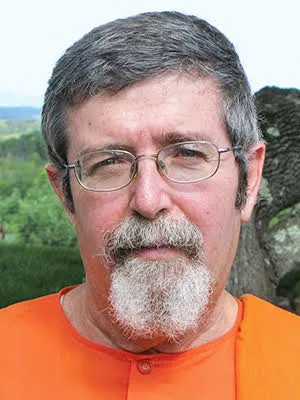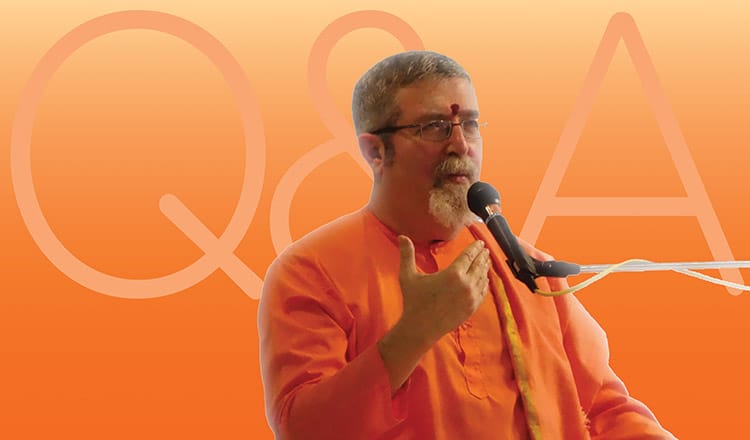Sivananda Bahamas Blog
Expand Your Horizons …
Our Blog
Learning to Distinguish the Real from the Illusory
As Printed in Yoga Life - Summer 2013 [Download the PDF here]
Question: How does one cultivate viveka?
Answer: Viveka means discrimination, or the ability to correctly discern one thing from another.
For instance, when we go to the market, what do we do? We look for the good vegetables, which go into our basket, and we leave the bad vegetables there. We do the same with good fruit and bad fruit. When we shop for shoes or clothes we check to see if there are any defects in them. We keep what is good and leave what is not good in the store. This is discrimination.
Normally, people who are more conscious will choose good food over bad food because it is healthier. They will choose clean air over toxic air, good exercise over laziness. If we have discrimination, we go to the gym, we practice yoga. We learn, first of all, how to discriminate between what is good for us and what is not good for us on a physical level.
There is also discrimination at the mental level, which is a very strange level of discrimination between pure thoughts and toxic thoughts. Although we would never take in spoiled or toxic food, something very bizarre happens when it comes to thoughts: We just joyfully let everything come in. This is very foolish because thoughts are more important, more essential, than physical food. Lord Jesus explains this very beautifully when he says, "It is not so much what comes into the mouth that affects us," meaning physical food, "but what goes out of the mouth that affects us," meaning what we say. The words we speak are physical, external expressions of our thinking so that others can understand our thoughts. Speech is manifested thought. Nevertheless, even though thought is more important than food, our discrimination on the mental level is usually lacking because we let all types of junk thoughts come in. We should not take in toxic thoughts any more than we should take in junk food. Swami Vishnudevananda taught the practice of positive thinking and meditation, which teaches us how to take in good thoughts. This is also a discrimination -- negative thoughts out, positive thoughts in.
Then we come to the ultimate discrimination. It is all well and good to keep our physical body healthy, or our mind healthy, but for what purpose? What is it good for except to improve our condition within samsara, within this vicious cycle of birth and death and misery in between? Think of it as if we are in a mega prison, a huge prison. We try to improve our conditions in the prison and this is one way to do it. Remember, though, that you are in a prison, so even if you improve your conditions there, suffering is still guaranteed. Misery is guaranteed. Really, you cannot improve your conditions in the prison. You can improve your physical condition and even your mental condition, which as a starting point is not bad, but unless you exit this mega prison that we call samsara, what you are doing is not so valuable. In the context of ultimate discrimination, just taking care of the physical body and the mind doesn't make much sense.
All the great achievements by any human being on this planet are done through the power of will, either good or bad. The people who climbed Mount Everest, how many times did they fail? How many lost their lives? But still they did not stop; they went on until they reached the top. That is called will power, but that will power did not come by merely wanting it. It came through action, suffering and pain.
You must understand that you can gain nothing without intense effort, without pain. That's the law: no pain, no gain. You will see one day that your pain will be converted into sweet fragrance, but you won't see it now, today, when you are suffering.
I went as an eighteen year old boy to Master's Ashram. I lived in the Himalayan caves. I lived in the tiger-infested forest. I lived alone. I did intense sadhana for years and years. Four times a day I did my sadhana, morning, mid-day, evening and midnight. I hardly slept -- only two or three hours. The will power created during that intense sadhana created all these Ashrams. The strength I gained through my will power and discipline is the cause of the materialisation of the Yoga Camp. So whatever you are doing, the pranayama, the asanas, getting up in the morning, it actually adds to your will power, your shakti. Don't think that what you are doing now is just a temporary thing. All of this has a cumulative effect.
The purpose of all this physical discipline through action, the asanas and pranayama, is to increase your inner will power. It will make it pure. At that time thought becomes very powerful. Anything that you think will materialise. That is the law. Nothing happens in this universe without your thought. But at present your thought is very vague. Like water flowing in a wide area it doesn't have any power.
Samadhi Estates, where my house is now, was a marshland, a complete swamp. Nobody could even walk there. I drained the marsh, made a small lake with an outlet, and created a waterfall and an island. It took planning. But without that planning that marshland would still be there and the mosquitoes would still be breeding. It is the same thing with your mind. Your mind contains the power, the energy, but it is just like a swamp. It has no force. A little water goes here, a little water there, a little stagnation. Mosquitoes start breeding. Somewhere some plants are growing, and some weeds. That can all be converted through positive action. That is what Yoga is all about.
Asanas are not just physical exercises. Asanas belong to the system of Raja Yoga: yama, niyama, asana. It's the third anga, the third limb. Asanas and pranayama are part of Raja Yoga. Patanjali did not elaborate on asanas and pranayama in the Raja Yoga Sutras except for 'Sthira-sukham asanam' -- easy comfortable pose -- and inhale, exhale. Why? Patanjali did not elaborate on them because in the ancient days in the Gurukula system they were practicing the yama, niyama, asanas, and pranayama in their daily life. Later on the energy level started to go down, people became tamasic, and their will power went. They were only thinking that they were Raja Yogis. They didn't want to practice any physical exercises. They lost their will power. The asanas and pranayama got watered down and became empty rituals that were performed without understanding. In every religion you will find empty ritual because the action is no longer understood.
Action without understanding will not bring will power. Blind faith will not bring will power. Mechanical action and blind faith are not the purpose of Yoga. We have both theory and practice: theory to understand the purpose behind it and then the practice with proper understanding and physical discipline. Then you become strong physically, mentally and spiritually. It's called the holistic approach. So don't learn anything blindly, just because Swami Vishnu says so.
Grain contains a lot of stones: you can remove the stones without removing the grains, or you can remove the grains without removing the stones. Once you have taken the grains away from the stones you throw the stones away. In a similar way, there are many stones in your mind so you extract the good things by repeating your mantra. Another example is a field with weeds. A field contains many weeds so you just pull them out. This is the purpose of mantra, the purpose of pranayama, and it is also the purpose of asana. It is not just physical exercise; it increases your will power.

Swami Swaroopananda is a senior disciple of Swami Vishnudevananda. A practicing yogi from a very young age, Swami Swaroopananda has dedicated his life to the practice and teaching of yoga. He taught in Yoga Teacher Training Courses around the world and is currently teaching advanced yoga philosophy courses and lectures internationally. He is Director of the Sivananda Ashram Yoga Retreat and acharya (spiritual director) for the Sivananda centers and ashrams in the Bahamas and the Middle East. He is a member of the Board of Directors of the International Sivananda Yoga Vedanta Centres.
Upcoming Courses
Swami Swaroopananda answers aspirants’ questions, clears troubled minds, and inspires listeners to advance on the spiritual path.
Swami Swaroopananda answers aspirants’ questions, clears troubled minds, and inspires listeners to advance on the spiritual path.
Swami Swaroopananda answers aspirants’ questions, clears troubled minds, and inspires listeners to advance on the spiritual path.
Swami Swaroopananda answers aspirants’ questions, clears troubled minds, and inspires listeners to advance on the spiritual path.
During this special time of year we invite you to join us in celebrating wisdom, love, compassion, and the transcendence of artificial barriers.
Swami Swaroopananda answers aspirants’ questions, clears troubled minds, and inspires listeners to advance on the spiritual path.
Swami Swaroopananda answers aspirants’ questions, clears troubled minds, and inspires listeners to advance on the spiritual path.
Swami Swaroopananda answers aspirants’ questions, clears troubled minds, and inspires listeners to advance on the spiritual path.
Swami Swaroopananda answers aspirants’ questions, clears troubled minds, and inspires listeners to advance on the spiritual path.
Swami Swaroopananda answers aspirants’ questions, clears troubled minds, and inspires listeners to advance on the spiritual path.
Swami Swaroopananda answers aspirants’ questions, clears troubled minds, and inspires listeners to advance on the spiritual path.
Swami Swaroopananda answers aspirants’ questions, clears troubled minds, and inspires listeners to advance on the spiritual path.
Swami Swaroopananda answers aspirants’ questions, clears troubled minds, and inspires listeners to advance on the spiritual path.
Swami Swaroopananda answers aspirants’ questions, clears troubled minds, and inspires listeners to advance on the spiritual path.
Swami Swaroopananda answers aspirants’ questions, clears troubled minds, and inspires listeners to advance on the spiritual path.
Swami Swaroopananda answers aspirants’ questions, clears troubled minds, and inspires listeners to advance on the spiritual path.
Swami Swaroopananda answers aspirants’ questions, clears troubled minds, and inspires listeners to advance on the spiritual path.
Swami Swaroopananda answers aspirants’ questions, clears troubled minds, and inspires listeners to advance on the spiritual path.








